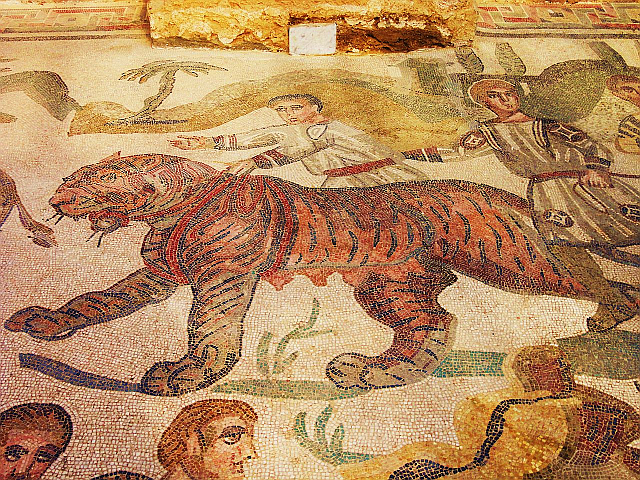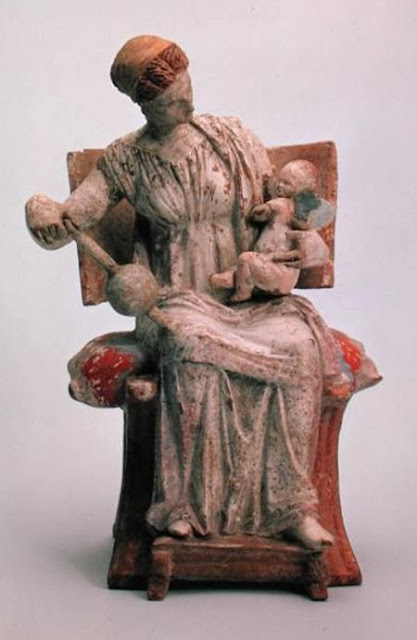Unlike Hippolytus, Theseus was a devotee of Aphrodite, and a builder of bonds, relations, between alien entities:
Theseus, in marked contrast, is linked to many women; four in particular stand out:
At the beginning of the Hippolytus, Theseus could have envisioned the fusion of a realm including Crete, Athens and Troezen, an incipient union of Attica, Argos and Minos' empire. By the end of the play, those prospects are gone.
The tale of his erotic exploits has him go on to capture Helen, leading to his entrapment in Hades, where he not only lost half his buttocks (gained the nickname hypolispos), but also Helen, who was re-captured by her brothers Castor and Pollux during his absence. "The rape of Helen is said to have filled Attica with war," says Plutarch. It intensified the rivalry between Athens and Sparta and led to Theseus' loss of the rule of Athens and to his eventual death in exile at Scyros.
More on Theseus here, here, and of course in Plutarch's life, which he paired with that of Romulus.
It cannot have escaped Euripides' notice that Theseus's choices of women were uniformly disastrous. And that it's Hippolytus' elitist ideas of eros, especially with regard to the love of women, that precipitates the hero's lethal curse upon his son.
As Heracles was the Dorian hero, Theseus was the Athenian founding hero, considered by them as their own great reformer: his name comes from the same root as θεσμός ("thesmos"), Greek for "institution". He was responsible for the synoikismos ("dwelling together") — the political unification of Attica under Athens, represented emblematically in his journey of labours, subduing highly localized ogres and monstrous beasts. Because he was the unifying king, Theseus built and occupied a palace on the fortress of the Acropolis that may have been similar to the palace that was excavated in Mycenae. Pausanias reports that after thesynoikismos, Theseus established a cult of Aphrodite Pandemos ("Aphrodite of all the People") and Peitho on the southern slope of the Acropolis.It is worthwhile to look at Hippolytus in relation to his father's devotion to Aphrodite Pandemos, which suggests an openness, an affability, a willingness to tolerate and accept all the people. Euripides is at pains to indicate how Hippolytus veers away from this democratic approach -- the young man prides himself on being a natural follower of Artemis, different from those who might have learned of her from books. His appreciation of her is bound up with his very nature, he says:
Shamefast Awe [αἰδώς] tends this garden with streams of river-water, for those to pluck who have acquired nothing by teaching but rather in whose very nature [80 φύσει] chastity [σωφρονεῖν (sound-mindedness, self-control)] in all things has ever won its place [εἴληχεν (connotations of chance, rather than artifice]: the base may not pluck.
Theseus, in marked contrast, is linked to many women; four in particular stand out:
Ariadne - daughter of Minos who betrayed her father/king, abandoned.If nothing else, the list suggests that Theseus was not put off by obstacles that might give pause to less pandemic followers of Aphrodite. None of these relationships led to solid alliances, either with the individual women or with their peoples.
Hippolyta - Amazon queen, mistress (?), mother of Hippolytus.
Phaedra - daughter of Minos, wife, mother of his two sons.
Helen - abducted by him and Perithoos when a young girl.
At the beginning of the Hippolytus, Theseus could have envisioned the fusion of a realm including Crete, Athens and Troezen, an incipient union of Attica, Argos and Minos' empire. By the end of the play, those prospects are gone.
The tale of his erotic exploits has him go on to capture Helen, leading to his entrapment in Hades, where he not only lost half his buttocks (gained the nickname hypolispos), but also Helen, who was re-captured by her brothers Castor and Pollux during his absence. "The rape of Helen is said to have filled Attica with war," says Plutarch. It intensified the rivalry between Athens and Sparta and led to Theseus' loss of the rule of Athens and to his eventual death in exile at Scyros.
More on Theseus here, here, and of course in Plutarch's life, which he paired with that of Romulus.
It cannot have escaped Euripides' notice that Theseus's choices of women were uniformly disastrous. And that it's Hippolytus' elitist ideas of eros, especially with regard to the love of women, that precipitates the hero's lethal curse upon his son.



